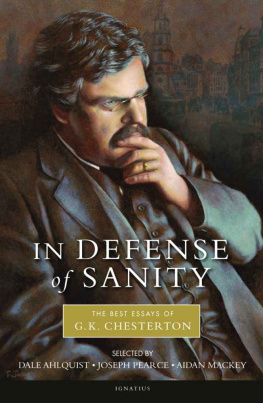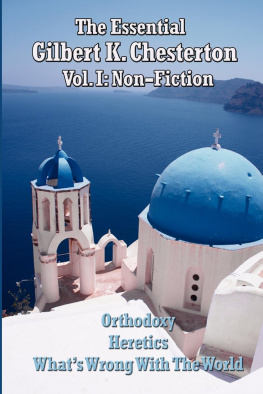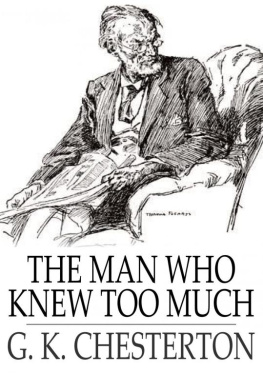Gilbert Keith Chesterton - The man who was Thursday: a nightmare
Here you can read online Gilbert Keith Chesterton - The man who was Thursday: a nightmare full text of the book (entire story) in english for free. Download pdf and epub, get meaning, cover and reviews about this ebook. year: 2001, publisher: Modern Library, genre: Art. Description of the work, (preface) as well as reviews are available. Best literature library LitArk.com created for fans of good reading and offers a wide selection of genres:
Romance novel
Science fiction
Adventure
Detective
Science
History
Home and family
Prose
Art
Politics
Computer
Non-fiction
Religion
Business
Children
Humor
Choose a favorite category and find really read worthwhile books. Enjoy immersion in the world of imagination, feel the emotions of the characters or learn something new for yourself, make an fascinating discovery.

- Book:The man who was Thursday: a nightmare
- Author:
- Publisher:Modern Library
- Genre:
- Year:2001
- Rating:5 / 5
- Favourites:Add to favourites
- Your mark:
- 100
- 1
- 2
- 3
- 4
- 5
The man who was Thursday: a nightmare: summary, description and annotation
We offer to read an annotation, description, summary or preface (depends on what the author of the book "The man who was Thursday: a nightmare" wrote himself). If you haven't found the necessary information about the book — write in the comments, we will try to find it.
Gilbert Keith Chesterton: author's other books
Who wrote The man who was Thursday: a nightmare? Find out the surname, the name of the author of the book and a list of all author's works by series.
The man who was Thursday: a nightmare — read online for free the complete book (whole text) full work
Below is the text of the book, divided by pages. System saving the place of the last page read, allows you to conveniently read the book "The man who was Thursday: a nightmare" online for free, without having to search again every time where you left off. Put a bookmark, and you can go to the page where you finished reading at any time.
Font size:
Interval:
Bookmark:
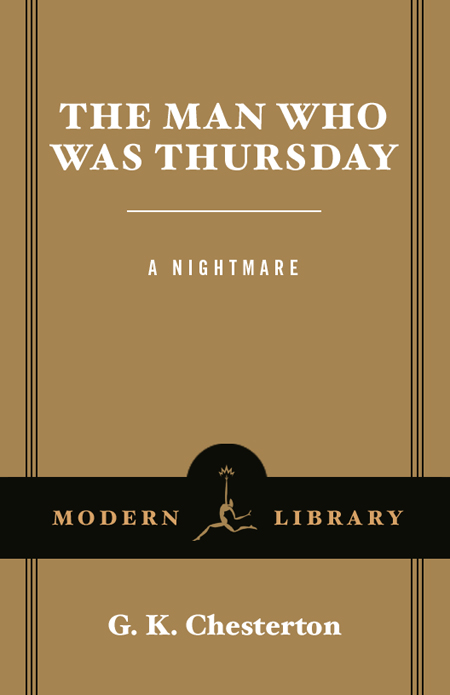
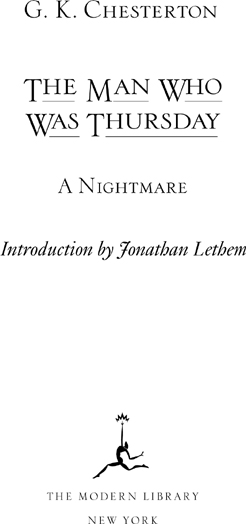
Gilbert Keith Chesterton, the genial and prolific writer who presided over the world of English letters during the first decades of the twentieth century, was born in London on May 29, 1874, into a cultivated middle-class family. Chesterton, while at St. Pauls School, was singled out as a student with distinct literary promise for his ability to recite long passages from Dickens, Scott, and Shakespeare. He later attended the Slade School of Art and University College, London, but abandoned his studies in 1895 to read manuscripts for a London publisher and eventually found work as a freelance journalist. Over the next decades Chestertons weekly articles in the Daily News, the Illustrated London News, the Daily Herald, and the New Witness established his reputation as a witty and provocative social critic who was a master of irreverent paradox. Long hailed as Fleet Streets reincarnation of Dr. Samuel Johnson, he began publishing his own journal of public opinion, G.K.s Weekly, in 1925. George Bernard Shaw deemed Chesterton a man of colossal genius and prompted him to write the play Magic, which was produced on the London stage in 1913. With Whats Wrong with the World (1910) he achieved recognition as a leading exponent of Distributism, a decentralized economic system in which private property would be divided into the smallest possible units. Chestertons conversion to Catholicism in 1922 occasioned his writing the biographies St. Francis of Assisi (1923) and St. Thomas Aquinas (1933), as well as The Everlasting Man (1925), perhaps the highest expression of his mysticism. Some of his earlier religious views were expressed in Heretics (1905) and Orthodoxy (1908). G. K. Chesterton completed his celebrated Autobiography (1936) less than two months before his death in Beaconsfield, near London, on June 14, 1936.
To follow Chestertons mind and its expression is an introduction to the English soul, remarked his friend, the writer Hilaire Belloc. He is a mirror of England. Chesterton initially gained prominence as a poet and literary biographer. His first published work, Greybeards at Play (1900), contains pure nonsense verse in the tradition of Lewis Carroll and W. S. Gilbert. I cannot think of a single comic poem by Chesterton that is not a triumphant success, said W. H. Auden. His next collection, The Wild Knight and Other Poems (1900), marked the real beginning of Chestertons career as a poet. The Ballad of the White Horse (1911), a long narrative poem that retells the story of King Alfred the Greats fight to keep the pagan Norsemen from taking over Christian England, is generally regarded as his greatest serious verse. Chesterton showcased much of his so-called political poetry in Wine, Water, and Song (1915) and presented his poems of World War I in The Ballad of St. Barbara and Other Verses (1922). Charles Dickens, his acclaimed critical biography of the great Victorian novelist, was published in 1906. It is conventional to say that Chestertons book on Dickens is the best thing he ever wrote, reflected V. S. Pritchett. It is not merely good; it is a masterpiece and contains, among other things, the most enlightening portrait of Dickens himself that I have ever read. Likewise T. S. Eliot stated that there is no better critic of Dickens living than Mr. Chesterton. Chesterton produced several other masterful works that artfully meld literary criticism with biography: Robert Browning (1903), George Bernard Shaw (1909), William Blake (1910), Robert Louis Stevenson (1927), and Chaucer(1932). The Victorian Age in Literature, perhaps his most famous work of literary criticism, appeared in 1913.
[Chesterton] had a genius simply for having original ideas, noted Wilfrid Sheed in discussing his brilliance as an essayist. It is hardly possible to read a page of Chesterton without finding an unexpected idea, at best wise, at worst fiendishly ingenious. The spillover of his thinking leaves us a body of aphorisms universal enough to belong to literature. During the course of his career Chesterton compiled hundreds of essays in a score of collections, including The Defendant (1901), Twelve Types (1902), All Things Considered (1908), Tremendous Trifles (1909), Alarms and Discursions (1910), A Miscellany of Men (1912), The Barbarism of Berlin (1914), The Uses of Diversity (1920), Fancies Versus Fads (1923), Come to Think of It (1930), All Is Grist (1931), All I Survey (1933), Avowals and Denials (1934), The Well and the Shallows (1935), and As I Was Saying (1936). Chesterton inherited from the aesthetes of the 1880s and 1890s the conviction that a writer should be continuously bright and epigrammatic, observed W. H. Auden. When he is really enthralled by a subject he is brilliant, without any doubt one of the finest aphorists in English literature. In addition, several volumes of essays culled from his papers have appeared posthumously, namely The Common Man (1950), A Handful of Authors (1953), The Glass Walking-Stick (1955), Chesterton on Shakespeare (1971), and The Apostle and the Wild Ducks (1975).
Chesterton also enjoyed success as a novelist and short-story writer. [It] is in his fiction that I find Chestertons genius best and most characteristically displayed, said Kingsley Amis. The novels and stories dramatize virtually the whole range of the themes and interests met in his other work. He made his debut as a novelist with The Napoleon of Notting Hill (1904), a futuristic tale set in 1984. The Man Who Was Thursday (1908), his next novel, was hailed by C. S. Lewis as a powerful picture of the loneliness and bewilderment which each of us encounters in his (apparently) single-handed struggle with the universe. His subsequent fiction includes The Ball and the Cross (1910), Manalive (1912), The Flying Inn (1914), and The Return of Don Quixote (1927). As Anthony Burgess commented: His best novelsThe Napoleon of Notting Hill, The Man Who Was Thursday, and The Flying Innare as entertaining as when they were first written, and the substructure of the farce and fantasya concern with free will, Western civilization, and the ultimate mysteries of religionis not less valid in the age of superstates and nuclear deterrents and brainwashing than it was in Chestertons more innocent heyday.
Today Chesterton is perhaps best remembered for his detective stories featuring Father Brown, a seemingly absent-minded cleric who possesses a profound understanding of evil. Originally published in the Saturday Evening Post, the stories were collected in The Innocence of Father Brown (1911), The Wisdom of Father Brown (1914), The Incredulity of Father Brown (1926), The Secret of Father Brown (1927), and The Scandal of Father Brown (1935). [Father Brown] is one of the greatest of all great detective figures, said Kingsley Amis. For many, he will always be the greatest. His field of knowledge is human nature, and his skills are observation, reason and common sense. Chesterton created several other amateur sleuthsnotably Basil Grant, Horne Fisher, Gabriel Gale, and Mr. Pondwho appeared in
Font size:
Interval:
Bookmark:
Similar books «The man who was Thursday: a nightmare»
Look at similar books to The man who was Thursday: a nightmare. We have selected literature similar in name and meaning in the hope of providing readers with more options to find new, interesting, not yet read works.
Discussion, reviews of the book The man who was Thursday: a nightmare and just readers' own opinions. Leave your comments, write what you think about the work, its meaning or the main characters. Specify what exactly you liked and what you didn't like, and why you think so.


